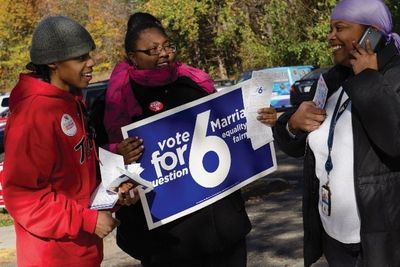Yoruba Richen examines the intersection of race, sexuality and religion in 'The New Black'
Filmmaker Yoruba Richen was fascinated with the contradiction that faced the nation following the 2008 elections. On one hand, the nation celebrated diversity and the election of our first black president but at the same time witnessed the removal of marriage rights for millions of same-sex couples in California with Prop 8’s passage.
“Despite the elation that many felt and demonstrations of joy in the street, there was also the anger that gay marriage had been taken away on this monumental night of the election of the President,” Richen shared. “Almost the next day African-Americans were being blamed for its passage and I found that quite disturbing and confusing. Some of it was based on this poll that came out that later proved false—that African-American's voted for Prop 8 in extremely high numbers—but it made me want to look into this narrative of black versus gay that was so potent and consistent.”
While the idea gestated, Ruben said that were waiting for another ballot initiative and in 2012, Maryland became that battleground and the setting for Richen’s film The New Black, which screen at OutFlix Film Festival in Memphis on Sunday September 8.
“I started to find characters who were working on this issue, who were trying to bridge that divide and in that point in 2008 we thought that 2010 might see another ballot initiative but it just so happened that it didn’t happen in California and happened in Maryland in this past election,” Richen said. “I had been working on the film for a couple years looking at folks were trying to bridge the gap between the gay community and the black community, working within the black church around this issue and with people who had been personally affected by this and then Maryland happened last summer and it kinda brought together all of the different pieces I had been looking at.”
While Maryland serves as the film’s setting, Richen is quick to point out the national themes that the documentary presents. “…the film goes into the wider themes of homophobia in the black church, the relationship between the community and the LGBT community and how the Christian right has inserted themselves into the fight.”
According to Richen, the film examines whether the black community should accept LGBT rights as a part of greater “human rights.” With increased coverage on race relations, the timeliness of Richen’s documentary cannot be debated. Given the day that the LGBT community celebrated history with the June 26 SCOTUS decisions, the Voting Rights Act was basically dismantled. When asked about the inverse of the black community’s relationship with the LGBT community, Richen also said the film implicitly examines that relationship.
“If you want to have a coalition where Black Americans and other people of color are supporting gay rights then the LGBT, white-dominated, male-led—although that’s changing—but what they call Gay Inc. has to also be on board for issues that are affecting the black community and other communities of color.”
The New Black has won audience awards across the country including at AFI Docs in Washington, DC, Q Fest in Philadelphia and Frameline in San Francisco.
“I've been so thrilled about how the film has been received and the enthusiastic response from the audience—it's really hitting a nerve,” said Richen. “But I'm really excited to see how the film is received in the South.”
The New Black screens Sunday September 8 in Memphis at OutFlix. For more information and tickets, click here.
